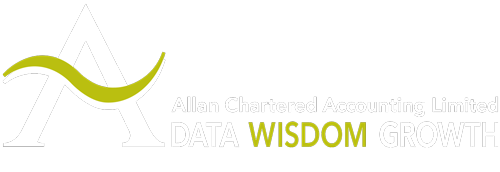With the end of the financial year on 31 March, 2025, it is vital for individuals and businesses to prepare thoroughly for filing income tax returns in New Zealand. Early preparation can help secure any available tax benefits and reduce unnecessary stress. This guide offers a practical checklist to ensure you have all relevant documentation and information on hand, making the process efficient and potentially maximising refunds. If you need extra assistance, Allan Chartered Accounting can provide professional guidance tailored to your circumstances.
1. Confirm Your Personal Details
Accurate personal details are essential. Errors in this area can lead to delays or rejections by Inland Revenue. Make sure you have the following items up to date:
- IRD Number
Your IRD number is the unique identifier Inland Revenue uses. Keep it on record and ensure it is current. - Full Name and Date of Birth
Your return must match your legal name and correct birth date, as recognised by Inland Revenue. - Contact Information
Update your address, phone number, and email address. This helps ensure any important notices or refunds get to you quickly. - Bank Account Details
Provide current bank account details so any potential refund can be deposited directly.
2. Gather All Income Records
The New Zealand tax year runs from 1 April to 31 March. Collect records of all income received during this period. Missing or under-reporting any portion of your income can lead to penalties or audits, so complete information is crucial.
- Salary and Wages
Compile payslips or summaries from every employer. In some cases, you can log in to your myIR account to confirm the annual amounts. - Self-Employment or Business Income
If you operate as a sole trader, partnership, or limited company, assemble profit and loss statements, balance sheets, and any relevant schedules of income. - Interest and Dividends
Banks and financial institutions usually provide year-end interest summaries. Dividend statements from companies and managed funds should indicate the amounts received as well as any taxes withheld at source. - Rental Income
Gather records of rental earnings if you own investment property. Include any records of property-related expenses, such as rates and insurance, in case you qualify for deductions. - Overseas Income
Declare all foreign income, such as overseas pensions or interest, along with details of any taxes paid abroad. This can involve exchange rates and special filing requirements. - Other Income Sources
This category includes trusts, estates, royalties, and cash payments earned through casual work. Every bit of income must be reported to avoid difficulties later.
3. Document Deductible Expenses
Tax deductions can reduce the amount of taxable income. Accurate documentation of expenses helps ensure you claim everything permitted by Inland Revenue. Some common deductions and credits include:
- Work-Related Costs
These may include uniforms, protective clothing, or specialised equipment required for your occupation. Maintain receipts or invoices to substantiate claims. - Home Office Expenses
If you work from home, calculate the area of the property used for business purposes, and then proportionately claim expenses such as electricity, phone, internet, and rent. Detailed records are essential in case Inland Revenue requests verification. - Vehicle Expenses
This applies if you use your car for business travel (not including regular commuting). Keep a logbook of business journeys and associated costs such as fuel, maintenance, and insurance. - Charitable Donations
Donations to approved charities can qualify for tax credits. Maintain valid receipts to claim these in your return. - Insurance Premiums
Income protection insurance can be deductible if it covers loss of earnings. Confirm with an accountant or advisor that your policy meets eligibility requirements.
4. Track Investments and Assets
If you have financial investments or capital assets, certain details need to be disclosed in your return. Maintaining clear and accurate bookkeeping is important in avoiding any penalties:
- Shares and Managed Funds
You may receive annual tax summaries from Portfolio Investment Entities (PIEs) or other fund managers. These statements typically outline your share of taxable income or losses. - Cryptocurrency
Keep a record of all trades, sales, and any income derived from mining. Inland Revenue views crypto assets as property, which means capital gains taxes and other considerations could apply. - Property Transactions
If you purchased or sold a property, collect the sale and purchase agreements, settlement statements, and valuations. The bright-line test might apply, leading to potential tax on capital gains if a property is sold within specific timelines.
5. Check Your Student Loan and KiwiSaver Details
- Student Loan
If you have a student loan, gather statements outlining repayments made throughout the year. Accurate reporting prevents possible shortfalls or penalties. - KiwiSaver Contributions
Compile details on how much you contributed, how much your employer added, and if any government contributions were received. These details are important for reviewing retirement savings and ensuring correct deductions.
6. Family Tax Credits and Other Benefits
Certain individuals qualify for additional benefits or credits. These can reduce the overall tax bill or even lead to refunds.
- Working for Families Tax Credits
Families earning under specific thresholds can receive payments that supplement household income. Ensure that you include all required details on income, residency, and childcare to support your claim. - Child Support Payments
Track both payments made and any amounts received. Inland Revenue can reconcile this information against tax returns, so precise figures are necessary.
7. Additional Points to Remember
- Provisional Tax
If you pay provisional tax, review your instalments for the year and confirm that the totals match your income. Underpaying can lead to interest and penalties, while overpaying ties up funds you could have used in your business or personal life. - Cash Jobs
Even income from small-scale activities, such as freelance or contract work, is taxable and must be included in your return. - Personal Recordkeeping
It helps to keep all relevant receipts, invoices, and logs in a central file or electronic folder throughout the year. Good records simplify your return at year-end.
8. Avoid Common Pitfalls
- Overlooking Minor Income
Failing to declare small sources of income can lead to large penalties if discovered. - Misplacing Documentation
Keep physical and digital backups to prevent the stress of lost records. - Claiming Incorrect Deductions
Confusion about allowable expenses can cause errors. Ask for professional advice if you are unsure. - Missing Filing Deadlines
Individuals without an extension must typically file by 7 July. Those who use a tax accountant may have until 31 March of the following year.
Everything You Need To Know For The Financial Year End
Tax time does not need to be overwhelming. Early organisation and thorough documentation can simplify the process. Collecting income statements, recording expenses, and tracking key information on assets and investments will help you file an accurate return and potentially maximise any eligible refunds. If you find the process too complex or have unique financial circumstances, Allan Chartered Accounting is ready to help. Expert assistance from a chartered accountant can ensure you stay compliant, reduce your tax burden, and approach the end of the financial year with greater confidence.

